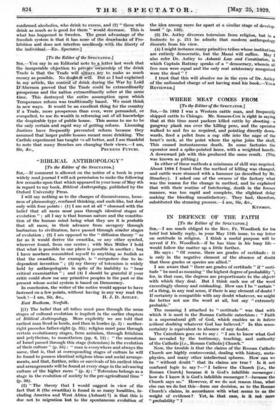"BIBLICAL ANTHROPOLOGY"
[To the Editor of the SPECTATOR.] comment is allowed on the notice of a book in your widely read journal I will ask permission to make the following few remarks upon that which appeared in your issue of May 4th in regard to my book, Biblical Anthropology, published by the Oxford University Press.
I will say nothing as to the charges of discursiveness, loose- ness of phraseology, confused thinking, and such-like, but deal only with four points : (1) I am not at all " obsessed with the belief that all races must pass through identical stages of evolution " ; all I say is that human nature and the constitu- tion of the human mind being what they are it is probable that all races, in their advance from savagery through barbarism to civilization, have passed through similar stages of evolution ; (2) I am opposed to the " diffusion theory " so far as it would derive the swastika, or any other symbol, wherever found, from one centre ; with Max Mailer I hold that what is possible in one place is possible in another ; but I have nowhere committed myself to anything so foolish as that the swastika, for example, is " everywhere due to in- dependent invention " ; (3) my theory of totemism is widely held by anthropologists in spite of its inability to " bear critical examination " ; and (4) I should be grateful if your critic could show me any primitive peoples in the past or the present whose social system is based on Democracy.
In conclusion, the writer of the notice would appear to have fastened on a few points, without having in any way read the
[(1) The belief that all tribes must pass through the same stages of cultural evolution is implicit in the earlier chapters of Biblical Anthropology. More explicitly we are told that earliest man lived in herds, and then in hordes (p. 5) : mother- right precedes father-right (p. 85) ; religion must pass through certain evolutionary stages, from animism, through fetichism and polytheism, to monotheism (pp. 8, 12) : " the ancestors of Israel passed through this stage (totemism) in the evolution of their culture " (p. 85) : " man is everywhere and always the same, that is, that at corresponding stages of culture he will be found to possess identical religious ideas and social arrange- ments, and that, further, relics or survivals of his earliest ideas and arrangements will be found at every stage in the advancing culture of the higher races " (p. 4) ; " Totemisin belongs as a stage in the evolution of society to the pre-agricultural time " (1a- 38)- (2) " The theory that I would suggest in view of the fact that it (the swastika) is found in so many localities, in- cluding America and West Africa (Ashanti ?) is that this is due not to migration but to the spontaneous evolution of
the idea among races far apart at a similar stage of develop. inent " (p. 123).
(8) Dr. Astley divorces totemism from religion, but in a footnote to p. 211 he admits that modern anthropology dissents from his view.
(4) I might instance many primitive tribes whose institutions are entirely democratic, but the Masai will suffice. May I also refer Dr. Astley to Ashanti Law and Constitution, is which Captain Rat tray speaks of a " democracy, wherein all free men were equal and the only real aristocracy recognized were the dead " 2 I trust that this will absolve me in the eyes of Dr. Astley of the unfounded charge of not having read his book.—Yous REVIEWER.]








































 Previous page
Previous page